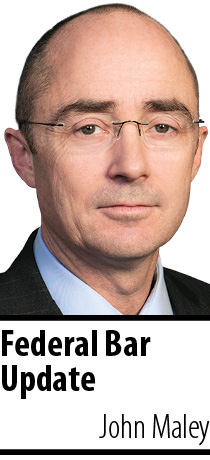Subscriber Benefit
As a subscriber you can listen to articles at work, in the car, or while you work out. Subscribe Now Each year any federal rule amendments that work their way through the Committee on Rules of Practice and Procedure, the Supreme Court, and then Congress, take effect Dec. 1. This year several rule amendments are scheduled to take effect on that date, as outlined below.
Each year any federal rule amendments that work their way through the Committee on Rules of Practice and Procedure, the Supreme Court, and then Congress, take effect Dec. 1. This year several rule amendments are scheduled to take effect on that date, as outlined below.
For the Federal Rules of Civil Procedure, Rule 30(b)(6) is being amended as follows to require good faith discussions regarding the matters for examination, with new text underlined and deleted text stricken-through: “(6) Notice or Subpoena Directed to an Organization. In its notice or subpoena, a party may name as the deponent a public or private corporation, a partnership, an association, a governmental agency, or other entity and must describe with reasonable particularity the matters for examination. The named organization must then designate one or more officers, directors, or managing agents, or designate other persons who consent to testify on its behalf; and it may set out the matters on which each person designated will testify. Before or promptly after the notice or subpoena is served, the serving party and the organization must confer in good faith about the matters for examination. A subpoena must advise a nonparty organization of its duty to make this designation to confer with the serving party and to designate each person who will testify. The persons designated must testify about information known or reasonably available to the organization. This paragraph (6) does not preclude a deposition by any other procedure allowed by these rules.”
The Committee’s Notes explain the reasoning behind this new obligation to confer, and are quoted in full below:
“Rule 30(b)(6) is amended to respond to problems that have emerged in some cases. Particular concerns raised have included overlong or ambiguously worded lists of matters for examination and inadequately prepared witnesses. This amendment directs the serving party and the named organization to confer before or promptly after the notice or subpoena is served about the matters for examination. The amendment also requires that a subpoena notify a nonparty organization of its duty to confer and to designate each person who will testify. It facilitates collaborative efforts to achieve the proportionality goals of the 2015 amendments to Rules 1 and 26(b)(1).
“Candid exchanges about the purposes of the deposition and the organization’s information structure may clarify and focus the matters for examination, and enable the organization to designate and to prepare an appropriate witness or witnesses, thereby avoiding later disagreements. It may be productive also to discuss ‘process’ issues, such as the timing and location of the deposition, the number of witnesses and the matters on which each witness will testify, and any other issue that might facilitate the efficiency and productivity of the deposition.
“The amended rule directs that the parties confer either before or promptly after the notice or subpoena is served. If they begin to confer before service, the discussion may be more productive if the serving party provides a draft of the proposed list of matters for examination, which may then be refined as the parties confer. The process of conferring may be iterative. Consistent with Rule 1, the obligation is to confer in good faith about the matters for examination, but the amendment does not require the parties to reach agreement. In some circumstances, it may be desirable to seek guidance from the court.”
Separately, Federal Rule of Appellate Procedure Rule 35(e) is being amended to provide for responses to a petition for hearing or rehearing en banc. If the court allows a response, the limits of FRAP 35(b)(2) apply to such responses. Specifically, responses would be limited to 3,900 words or 15 pages. Likewise, FRAP 40 is being amended to clarify that the provisions of Rule 40(b) regarding a petition for panel rehearing also apply to a response to such a petition, if the court orders a response. Those limits are likewise 3,900 words or 15 pages.
Save the date: This year’s annual federal civil practice seminar will be Friday, Dec. 18, from 1:30-4:30 p.m., with remote access.•
• John Maley — [email protected] — is a partner with Barnes & Thornburg LLP, practicing federal and state litigation, employment matters, and appeals. He clerked for Judge Larry McKinney from 1988-90. Opinions expressed are those of the author.
Please enable JavaScript to view this content.
